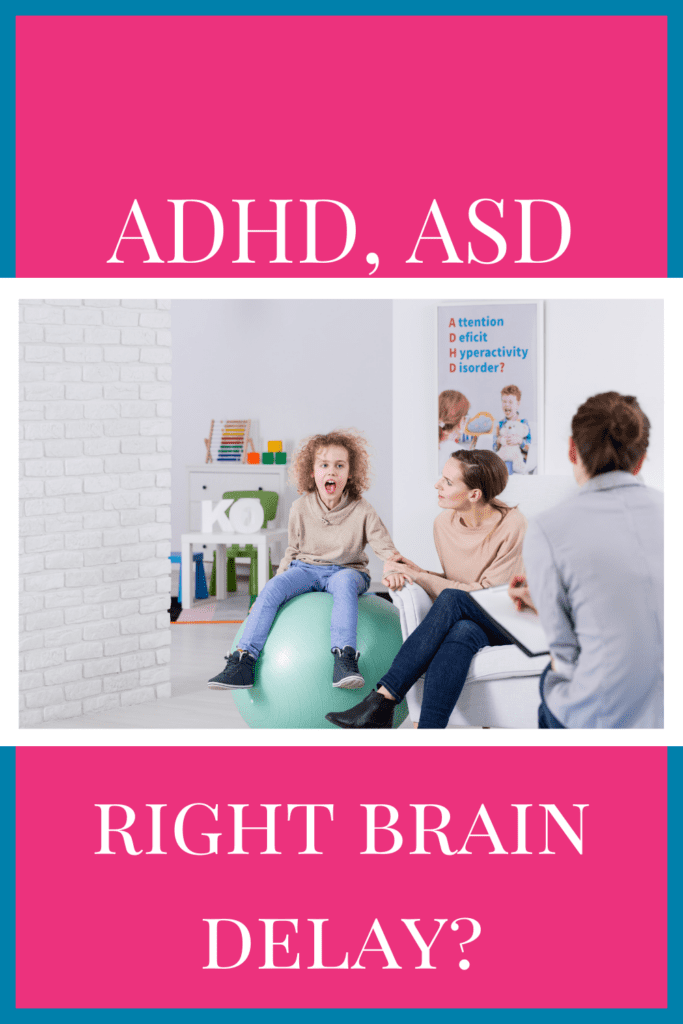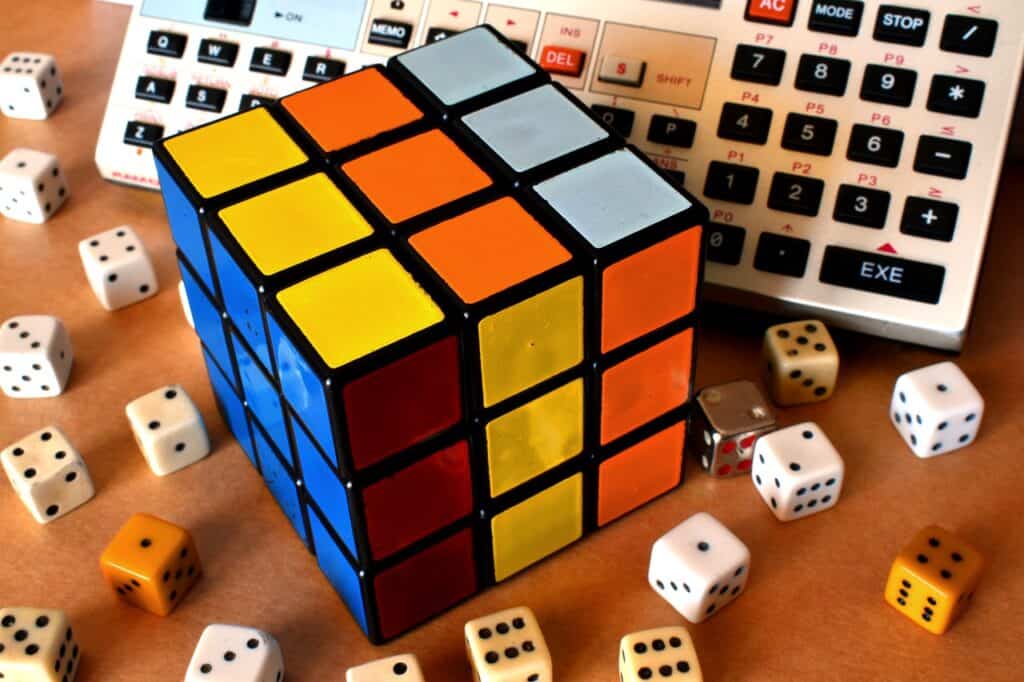“Josh didn’t crawl, he didn’t walk – he ran,” his mom laughed and rolled her eyes as she reflected on the warning signs she had missed. Rhonda felt like she had been running after him since he was a toddler.
If a child has a right brain weakness or underdevelopment, their difficulties are usually detected much sooner than the child with a left-brain deficiency. This is because while the right brain is the ‘brakes’, the left brain is the ‘gas’.
The right side of the brain develops first which is why this side of the brain is more likely to be affected by early environmental insults such as traumatic childbirth, toxicity or insufficient stimulation. It is for this reason that right brain delays are more common than left brain delays.
Common Profile of a Right Brain Deficient Child
When the right brain is underdeveloped, it typically appears as behaviour challenges: hyperactivity, impulsivity, defiance, OCD, sensory processing issues or poor social skills.
These kids don’t struggle with learning anywhere near like the kids with a left-brain underdevelopment.
Instead, these kids have a left-brain overdevelopment and are often quite intelligent – and may even have above average intelligence. They may have hyperlexia (early readers) but man! – Do they keep their moms busy!
School – Kicking the Left Brain in High Gear
It’s not long into their first year of school that these kids’ teachers are calling home about their concerns with behaviour. They either can’t sit still, can’t focus, speak out in class, may be defiant or if they are on the spectrum, they may have meltdowns from too much noise or stimulation and struggle with communication and social skills.
This is because a hallmark of these kids is they have sensory processing issues and the over-stimulation of the classroom can push them over the edge.
The Sensory Kid
These kids might be picky eaters, sensitive to sound, light, touch and the seams on clothing like socks and underwear might bother them. They might even dislike movement and be sedentary because movement is over-stimulating.
Other kids are sensory seeking. They talk louder than other kids and don’t realise it, they might be rougher and use more pressure or force when playing compared to other kids and they may crave constant movement and even be risk takers.
Motor Skills and Visual-Spatial Skills
While some of these kids can be movers or athletes, the right side of the brain is responsible for gross motor skills which is why it is common that these kids may have poor posture, gait and even suffer from dyspraxia.
These kids also may not have the greatest art skills since the right side of the brain is involved with the visual-spatial skills. As a result of a compromised visual cortex, they might have poor visual processing and a weak visual memory but have a strong auditory memory.
The Academic Slide
Depending on the severity some parents hope their child will grow out of it while others are at their wits end between the phone calls form the school and the battle at home that they may opt for medication.
Because these kids are often quick to learn, their academics often don’t suffer at first unless they have more moderate to severe cases of ASD.
However, as factors like poor focus, impulse control and social skills continue, their ability to keep up academically can really be impacted and can result in them falling behind their peers.
Peers, Socializing and Emotional Intelligence
They might struggle socially either because of their impulsive or quirky behaviour, because they say the wrong thing, are too blunt and this may cause them to start hating school. They may complain that they don’t fit in, that the teacher hates them and that other kids are mean to them.
Unlike the child who has an overdeveloped right brain, these kids tend have a lower Emotional Intelligence. In ADHD or ASD kids it might appear mild as if they don’t show much emotion or don’t seem to connect or bond with other family members, or kids.
Common Diagnosis
- ADHD/ADD
- ASD – Autism
- SPD
- ODD
- OCD
- Tourette Syndrome
- Dyspraxia/ Developmental Coordination Disorder
- Schizophrenia (if severe)
The Left Loves Logic, Sequences and Patterns
The left brain controls the fine motor skills, decodes sounds and letters, does sequencing, is logical and views the world in small details. It is curious and scientific, and it loves routine. It is literal which is why kids on the spectrum may have difficulty with facial expressions body language, sarcasm and abstract expressions like ‘Don’t count your chickens before they are hatched.”
The left brain is all about patterns which is part of language, reading, playing a musical instrument and even playing video games.
This is why these kids can be quite the ‘gamers’. Unfortunately, constant gaming just over-stimulates the left brain even more even though it keeps these kids focused and out of mom’s hair for hours.
The Gifts of the Left-Brain Kid
While these kids may struggle incredibly with behaviour, focus, social skills and/or communication their left-brain overdevelopment gives them incredible gifts or areas of genius.
Because the left brain is responsible for IQ, these kids are often very intelligent and curious. They are often excellent at math, make great scientists or be adept at learning languages.
Their highly developed auditory cortex is why so many of these kids are musicians or have a real passion for music. Their well-developed auditory cortex may also be the reason many of these kids are so good at remembering and reciting facts.
Learning and Reading Difficulties
ADHD or even ASD (especially if it’s mild) can look like a learning disability because a child has a hard time focusing and paying attention long enough to learn anything. Kids with ASD and SPD may be too overwhelmed with the sensory stimuli in the classroom to take in any information, concentrate or complete a task.
Over time this can create learning gaps and look like a learning disability when in fact it is ADHD or ASD.
Right Brain Weaknesses – Not Dyslexia
When kids with a right brain weakness have reading difficulties, it’s often mistaken for dyslexia when in fact it is not. When these kids have trouble reading it can be due to a difficulty focusing long enough to learn letter sounds or comprehend the meaning of a text.
Visual Processing Related Reading Difficulties
However, it can also be due to poor visual processing. Sadly, many adults as well as teachers still think dyslexia is when children see letters or words backwards.
Dyslexia occurs when there is a phonemic deficit, and a child therefore has a hard time processing the smallest sound units of language. This is very much connected to the auditory cortex which is on the left side of the brain.
Visual processing on the other hand occurs on the right side of the brain so it should come as no surprise that kids with a right brain delay are more likely to have reading difficulties due to letter reversals, letters moving, blurred vision and they may even have visual processing disorder.
ADHD, ASD is Often a Left Brain Overdevelopment and Right Brain Delay
Of course, every child is different and there is no ‘cookie-cutter’ right brain delay child, but what the research and brain scans do show are kids with ASD and ADHD often have significantly more electrical activity on the left side of their brain and a lack of electrical activity and therefore maturity on the right side of the brain.
The good news is like the video games that can further overdevelop the left brain, other stimulations to the right brain can also develop new connections in the right brain where there is inactivity and immature development. This is exactly what happened to Josh after he completed my 6 month program, The Full Potential Formula. Suddenly, he was calmer, more focused and less emotionally reactive – and so was mom.
If you want to learn more about my program, schedule a free Clarity Call to learn more about my program and how it can help your child rise to their full potential.
In Health & Wholeness,
Lorraine XO
Sources:
Dr. Robert Melillo – Disconnected Kids
Iain McGilchrist – The Master and His Emissary: The Divided Brain


